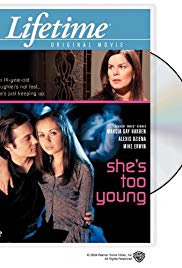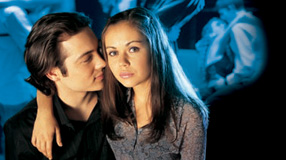PEER PRESSURE, BAD ASSOCIATIONS, ROMANTIC RELATIONSHIPS, SELF-ESTEEM, AND TAKING CARE OF YOURSELF
Teacher Notes: Ask questions that will get students talking about the diseased nature of the social system at the high school shown in the film. Points to look for in a good discussion are: (1) the culture of the school shown in the film was oppressive to girls; (2) the girls suffered psychological injury; (3) the boys shown in the movie, except for Tommy, were also damaged because their focus on sex deprived them of any loving relationship with girls. Consider one or two of the following questions to get a discussion going.
1. [Ask a variation of the question suggested for the introduction to the movie.] Are the portrayals of teenagers in this film realistic? What could the filmmakers have done differently that would have made the characters of the teenagers more true to life?
2. Does the social system in the school shown in the film remind you of your own school or any other school that you know about?
3. How are the experiences of the girls featured in this movie going to affect them later in life?
4. What did the boys shown in this movie lose by treating the girls the way they did?
5. What do you think of Nick and his friends?
6. What do you think of the relationships between boys and girls shown in this school?
7. What do you think about Hannah as a person?
8. What do you think about Dawn as a person?
9. What do you think about Becca as a person?
10. What do you think about Nick as a person?
11. What do you think about how students treated each other at this high school?
Additional Discussion Questions
12. What does the incident of the near rape of Hannah demonstrate? Suggested Response: Rape and attempted rape are terrible violations of the person being attacked. For that reason, they are felonies punishable by years in prison. However, the boy who tried to rape Hannah was accepted by the group and Nick did not stop him. This shows that when there is no respect for women, criminals will take advantage of the situation.
13. How does Nick lead Hannah into giving him oral sex? Suggested Response: At first Hannah tells Nick that she doesn’t want to have sex with him and he counters by saying, in an annoyed tone, “Do you want to play Scrabble or watch another movie?” He says that he wants to have sex just to get closer to her. Then he says, “Maybe I should just take you home.” At this point, Hannah stops him from leaving, and then gives him oral sex. Nick plays upon Hannah’s desire to be popular and her crush on him in order to get what he wants. She knows that if she turns him down, the whole school will hear about it the next day. While it is ultimately her choice to give him oral sex, she is being heavily influenced by peer pressure.
14. Did any of the boys succumb to peer pressure? If so, who, and in what ways? Suggested Response: Nick did, when Hannah was almost raped. Nick yelled at his friend Brad to stop, but Brad just turned around and gave him a look. Nick shut up and didn’t do anything else, letting Brad continue.
15. What could the girls in this situation have done to take care of themselves? Suggested Response: The girls were in a difficult situation and no choice that they made would have been without sacrificing something that they valued. However, they didn’t need to give in. They could have simply given up on being popular and opted out of the sick culture of the school. They could have changed schools.
PARENTING and FAMILIES IN CRISIS
16. [Ask a variation of the question on parent-child relationships suggested for the introduction to the movie.] Are the portrayals of relationships between teenagers and their parents in this film realistic? What could the filmmakers have done differently that would have made these relationships more true to life?
17. Dawn’s mother wasn’t acting like a mother. The following exchange happened when Dawn told her mom, Ginnie, about her syphilis.
Ginnie: “Tell me what to do!”
Dawn: “How am I supposed to know?”
Ginnie: “Do you want me to ground you? I don’t wanna stop you from having a good time.”
Dawn: “You want me gone, so you can have a good time!”
Ginnie: “That’s ridiculous! Dawn, honey, I love you, of course I want you to have fun. I’m your best friend!”
Dawn: “No, you’re my mother and I wish you’d start acting like it.”
What is Ginnie doing wrong in this conversation?
Suggested Response:
Mothers need to be leaders for their children and not ask their children what to do. Parents are not best friends of their children, especially when faced with a daughter who has syphilis. Ginnie should be concerned and loving, set limits and try to find out why her daughter acted in a way that would expose her to an STD.
18. What kind of example was Ginnie setting for Dawn? How did her mother value sex?
Suggested Response:
Ginnie was not setting a positive example. She had multiple boyfriends, would stay out late, and failed to provide a stable family life. Ginnie considered sex to be something fun and frivolous, and not something with any real consequences. She was interested in her daughter’s (and Hannah’s) dating life because she was trying to live vicariously through them. Not only did she set a horrible example for Dawn (who chose to emulate her), she also affected her younger daughter who began to follow in Dawn’s footsteps.
19. Is it right for parents to know about their high schooler’s sex life? Or to ask? When does that right cease to exist, if it ever does exist?
Suggested Response:
This is a good question for debate, and will no doubt receive differing answers. Many parents have their own opinion on this subject.
20. Given the nature of the community in this high school, could the parents who were shown in the film have done anything to prevent their kids from becoming promiscuous?
Suggested Response:
Some of the parents could have been more involved in their children’s lives, preventing parties from being held at their houses, keeping track of their children’s activities. Perhaps they could have had a stronger sex education program.
21. When Dawn told Becca and Hannah that she had syphilis, why was Becca so mean to her?
Suggested Response:
Becca felt threatened. Maybe in the back of her mind, she knew all along that something wasn’t right, or that she was potentially exposing herself to STDs, but when Dawn told her about contracting Syphilis, Becca didn’t want to face reality. She didn’t want to think about what this might entail, and possibly she didn’t want this to dampen her sex life.



